’Too far’: Shoppers rage over scene in US Target stores
Target stores in the US have become near “impossible” to shop at after implementing a confronting tactic to combat theft. Here’s why Aussies should be concerned.
Retail
Don't miss out on the headlines from Retail. Followed categories will be added to My News.
Target stores in the United States have become near “impossible” to shop at after implementing a confronting tactic to combat theft.
Last year, a wave of shoplifting and organised crime raids cost the retail giant more than $500 million in profit, Target officials said - and now everyday customers are paying the price.
Want some undies or socks? They’re locked up. Toothpaste? Locked up. How about some washing detergent? That’s behind a security screen too.
Customers need to hold their hand under a sensor and wait for a staff member to unlock the plastic shield – a process exacerbated by an industry crippled by understaffing.
It’s important to note that – despite the similar logos and identical names – Target in Australia is an entirely different company to the giant in America.
But leading consumer expert Graeme Hughes said not to rule out “a continued evolution of security measures” Down Under.
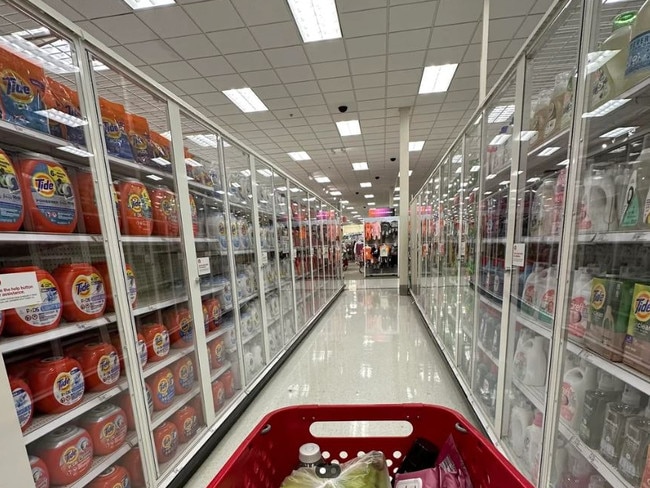
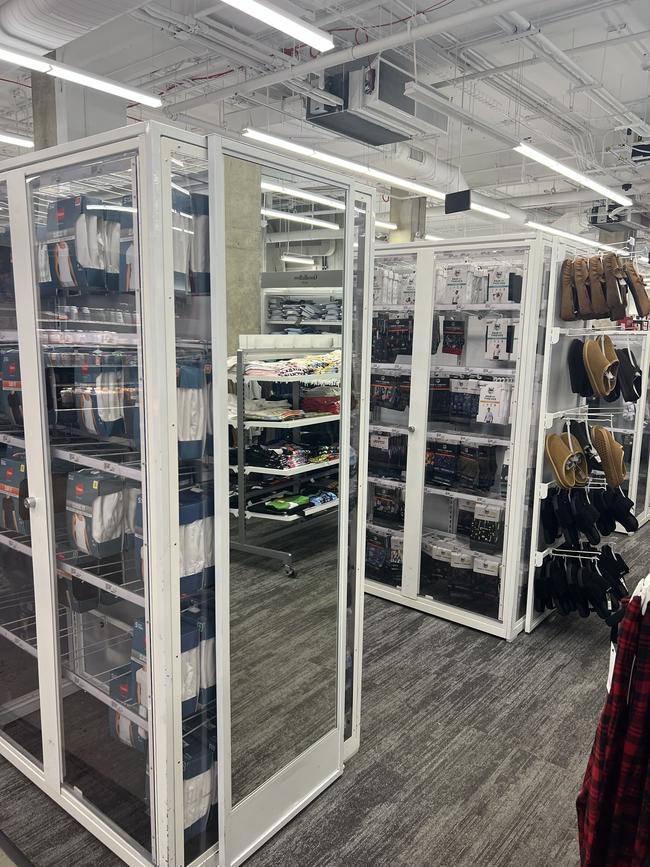
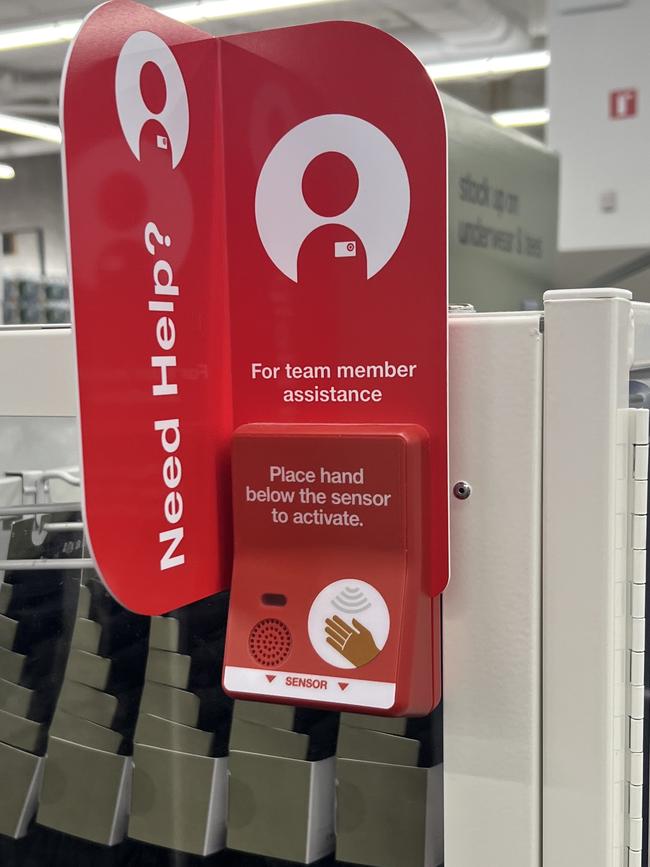
“While Australia may not have reached the same level of overtness in terms of locking up merchandise, it’s clear that retailers are also grappling with similar challenges,” Mr Hughes told news.com.au.
“The practice of placing higher-end items like fragrances, watches, jewellery, and electronics behind glass cabinets is a common strategy to deter theft.”
Mr Hughes, a business and technology lecturer at Griffith University, said America’s “significant shift towards more stringent security” was driven largely by rising crime rates and economic pressures.
“The decision to lock up merchandise is a delicate one. On the one hand, it can help to reduce losses due to theft and maintain accurate stock levels,” he explained.
“On the other hand, it can create friction for customers, leading to longer wait times, limited product interaction, and a sense of distrust.”
Mr Hughes stressed that Australia’s retail landscape differed largely from America.
“The smaller number of one-stop retailers allows Australian businesses to implement alternative security measures, such as increased staffing and enhanced security systems,” he said.
“This approach aims to strike a balance between protecting merchandise and providing a positive customer experience.”
Phil Lempert, CEO of Supermarket Guru, said US retailers appeared to be pulling back on some of the more extreme security measures in response to customer frustration.
He said the biggest problem was that retailers didn’t have enough staff to be able to unlock doors.
“Some retailers are experimenting with having shoppers using the store’s app to unlock the devices – but I’m not sure that solves the problem of theft,” he told news.com.au.
The grocery analyst said it was a “troublesome situation” with no obvious solution.
“Yes, theft is on the rise. Yes labour shortages (and rising hourly wages) are real.
“I hate to say it - but it just forces people to shop online to avoid the hassle of in-store shopping. It’s a no-win for retailers and for shoppers.”
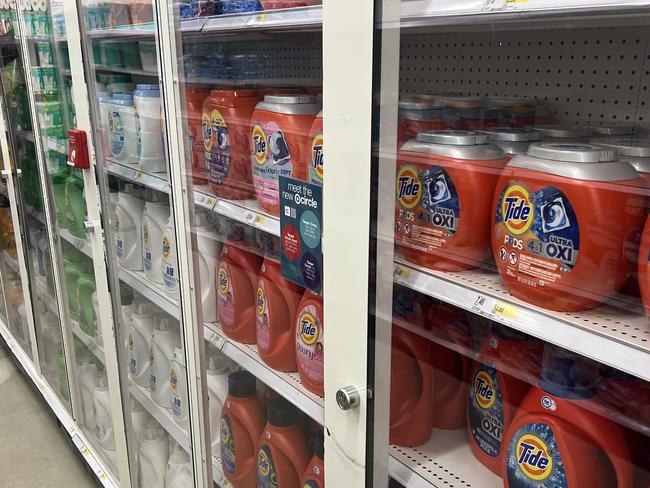
Nation’s fury over extreme security measures
Americans are fed-up.
“Target has really taken things too far. Everything is locked up,” one frustrated customer shared online this year, revealing they had to use the “call button” three times in a matter of minutes.
“We’re going to slowly make the complete circle back to general stores where everything is behind a counter and the shopkeeper just grabs it for you and rings it up,” added another.
“At this point I’ll just order off of Amazon instead and skip target. Corporate is really out of touch if they think this won’t cause a mass exodus of customers,” wrote a third.
Brooklyn resident MJ Knefel took to X in June after discovering his local pharmacy had locked up all of its toiletries and taken out all the help buttons needed to alert staff.
“Congrats, you have created a store that is literally impossible to shop at,” he wrote.
Despite the overwhelming swell of criticism online, Target CEO Brian Cornell insisted customers largely had a “positive” reaction to the security measures.
“What we hear from the guests is a big thank you, because we are in stock with the brands that they “need when they’re shopping in our stores,” he told CNBC in 2023.
“And because we’ve invested in team member labour in those aisles and make sure we’re there to greet that guest, open up those cases and provide them the items they’re looking for.”
When asked if the measures had resulted in a drop in sales or traffic, he claimed it had had the “opposite” effect.
“The fact that we’re in stock is what’s most important for the guests,” he said.
“And they understand the fact that we’ve had to make some changes to ensure the safety of the product and the fact that they have product in stock when they’re shopping the stores.”
in an analyst call in August, the retailer said shrink (industry speak for shoplifting) had improved.
“We’re ahead of where we expected to be in terms of progress on shrink,” Target chief operating officer Michael Fiddelke said, according to CNN.
Joe Budano, the CEO of Indyme, a company that makes a security tool that lets customers unlock products on the shelves using their phones, called the cages “the bane of retail.”
He told the Wall Street Journal that locking up products led to a 10 to 25 per cent reduction in sales and an extra 500 hours of labour a year per security screen.
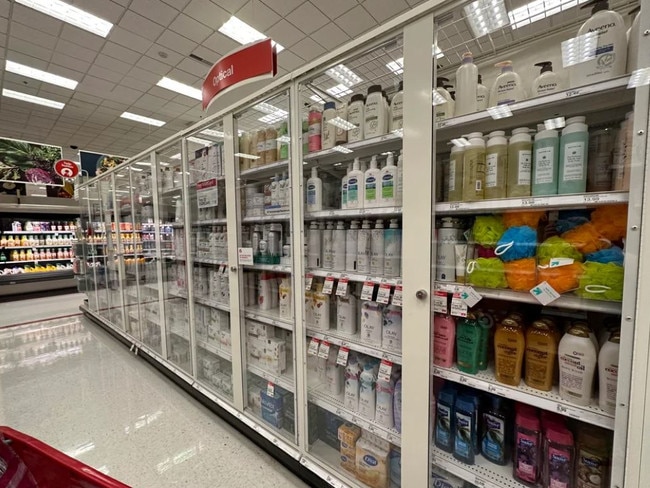
Amazon cashes in on anti-theft measures
Target’s not the only US retailer to lock up everyday merchandise.
America’s three largest pharmacy chains – accounting for 20,000 stores across the nation – have all resorted to the same radical measures, along with Walmart and Dollar Tree.
GlobalData retail analyst Neil Saunders said barricading items had had a negative impact on consumer.
“Locking up products worsens the shopping experience, and it makes things inconvenient and difficult,” he told Axios.
Saunders added that the anti-theft measure encouraged customers to shop online.
During a call with investors in August, Amazon CEO Andy Jassy spoke of the “speed and ease” of ordering online rather than shopping at pharmacies in-store.
“It’s a pretty tough experience with how much is locked behind cabinets, where you have to press a button to get somebody to come out and open the cabinets for you,” he said.
Though the measures may reduce theft, it’s still not entirely clear whether it makes a meaningful impact on saving retailers money.
Manmohan Mahajan, the global CFO of Walgreens, admitted in a June earnings call that the company was experiencing “higher levels of shrink.”
Despite reports of sales drops and customer dissatisfaction, stores have continued to defend their lock-up techniques.
CVS spokesperson Amy Thibault told Axios the retailer uses “a variety of different measures to deter or prevent theft and locking a product is a measure of last resort.”
“Different products experience different theft rates, depending on store location and other factors, and our product protection decisions are data driven,” she continued.
Walgreens spokesperson Fraser Engerman told the publication, “Actions like installing anti-theft devices are to deter theft and ensure safety and security in our stores.”
Engerman continued,:”These steps are taken in response to theft data and for that reason only, and these additional security measures allow us to improve on-shelf availability of products to customers.”
Originally published as ’Too far’: Shoppers rage over scene in US Target stores



